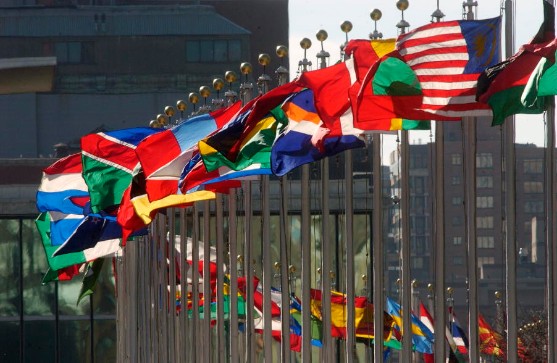 Courtesy of United Nations Photo via Flickr
Courtesy of United Nations Photo via Flickr
Reviving Global Democracy: Public Diplomacy in the Post-COVID-World
The COVID-19 pandemic is exacerbating the ongoing global democratic recession and worsening human rights conditions around the world. A recent Freedom House report stated that 2021 marked the 15th consecutive year of global democratic backsliding. Meanwhile, those living in democracies are becoming more dissatisfied with how democracy works. Even traditional democratic beacons, such as the United States and European nations, are facing challenges—hyper-polarization, election delays, discrimination, and disinformation.
As a result, China and Russia are taking advantage of these shortcomings to discredit democracy and undermine international norms. China pointed toward a poor COVID-19 response and ongoing racial injustice to highlight failures of American democracy. Meanwhile, Russia spread disinformation to influence US elections, stoke panic around COVID-19, and fan social tension.
Recognizing this downward trend, nations have called for a global democratic revival. Germany suggested a Marshall Plan for democracy. Sweden launched the Drive for Democracy, while an EU Action Plan for 2020-2024 called for greater human rights and democracy promotion. However, these piece-meal plans are not enough. The United States should lead its allies in a concerted effort to prioritize democratic revival as the cornerstone of the global COVID-19 recovery strategy. This coalition can lay the groundwork for a more resilient global democracy through public diplomacy initiatives that foster transnational networks around emerging issues and strengthen democracies vulnerable to backsliding.
Building a Supporting Infrastructure for Global Democracy
As the world recovers from COVID-19, the U.S. should work with middle-democracies to recommit to democratic principles, stand up to human rights abusers, and strengthen collaboration around emerging transnational security challenges to build a more resilient future.
The United States’ first challenge will be to repair its own democratic deficit and regain credibility as a global influence for democracy. A slow COVID-19 response, ongoing racial injustice, and political polarization has furthered the loss of American credibility and international esteem. Without consistently demonstrating at home the democratic values it professes abroad, the U.S. remains vulnerable to criticism from authoritarian regimes and will fail to gain the necessary support from foreign publics to recommit to democratic principles globally.
Strengthening a Democratic Foundation With Public Diplomacy
Coordinated public diplomacy initiatives should serve an integral part of multilateral efforts to revive global democracy. Public diplomacy can help coordinate state actors, private industry, and other civil society organizations to innovate, share knowledge and resources, and promote democratic values. In addition, engaging publics as stakeholders in the governance process, in and of itself, promotes democratic values and government accountability.
Collaborations should prioritize partnerships with areas vulnerable to backsliding, such as Eastern Europe, Latin America, and Asia-Pacific. In addition, support should be provided to young democratic nations. For example, Brazil and India are two of the world’s largest democracies yet democratic processes and values are being undermined by their current authoritarian leaning leaders.
Public diplomacy initiatives to build democratic resiliency should concentrate on transnational security challenges that threaten democratic systems, such as:
- International health security: Safeguarding against coronavirus variants and future pandemics requires science diplomacy to coordinate information sharing and monitoring practices. Moreover, vaccine diplomacy efforts will be key to equitable vaccine distribution, especially as more doses become readily available.
- Climate Change: Climate change will drive regional and global instability by fueling more frequent and intense natural disasters, influencing migration trends, and disrupting global food chains. Addressing climate change and reducing its resulting impact will require coordinating multilateral efforts.
- Economic Recovery: Across the globe, economic discontent is related to dissatisfaction with democracy. Public diplomacy initiatives that foster cross-sectoral innovation to smooth the transition toward a green economy can aid in the post-pandemic recovery.
- Anti-corruption: China and Russia have weaponized corruption and kleptocracy to undermine democracies and advance foreign policy objectives. An integrated global approach to financial transparency and accountability is necessary to improve and safeguard democratic governance.
- Internet Freedom: As nations struggle with emerging cyber and digital threats, digital authoritarianism is on the rise. Facilitating partnerships that provide innovative ways to counter disinformation without restricting or censoring internet access will be critical in preserving an open and global internet.
The DNI Global Trends 2040 report describes a bleak outlook of a fracturing world where democratic values are on the decline. To realize the most positive outcome of a global democratic renaissance, the United States should lead a multilateral effort to revitalize democracy as the world emerges from the pandemic. Public diplomacy initiatives that foster transnational networks of innovation will be an integral part of creating an adaptive infrastructure to support democratic values in the face of emerging threats.







